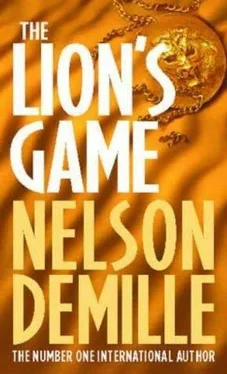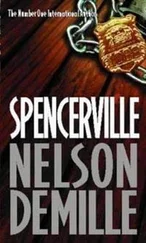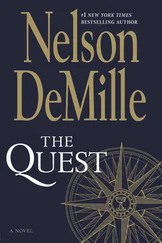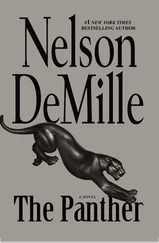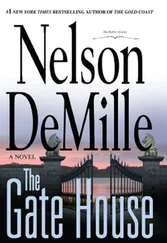That wasn't exactly what I had in mind, but it was good for Fleming and Rhee to hear that one of us was sane.
Ms. Mayfield continued her mission statement and said, "If Mr. Wiggins shows up first, then we'll interview him and ask that he turn over the premises to us, then someone here can escort him to another location. In either case, we intend to remain in this house waiting for the suspect, who we believe is headed this way."
Ms. Rhee replied, "We have determined that six is the optimum number of agents we want in the house for safety and logistical reasons. So if the suspect shows up at this location, we'll ask you to take a position in a back room, which we'll show you."
I said, "Look, Ms. Rhee, Mr. Fleming, we could all be here a long time, sharing the bathroom and bedrooms, so why don't we cut the shit and try to get along? Okay?"
No response.
Kate, to her credit, changed her tone and said, "We've worked this case since Asad Khalil landed in New York. We've seen over three hundred dead people aboard the aircraft he arrived in, we've had a member of our team murdered, our secretary murdered, and the duty officer murdered."
And so on. She put it to them, too nicely, I thought, but they got the message and actually nodded when Kate was finished.
Meanwhile, I looked around the living room, which was sparse, yet tasteless. Also, untidy, which I'd like to blame on the Feds, but which I thought was probably a reflection of Mr. Wiggins' attitude toward life.
Ms. Rhee offered to introduce us to her colleagues, and we followed her into the kitchen, while Mr. Fleming took up his position at the front picture window, peering through the Venetian blinds. High-tech. But, of course, someone on stakeout would tip us if anyone approached the house.
The kitchen was dimly lit by a soft fluorescent bulb under a cabinet, but I could see that the kitchen was circa 1955, and in it were another man and woman, also wearing the urban commando outfit of dark trousers, dark blue shirts, and nylon windbreakers. Their blue baseball caps sat on the counter. The man was seated at the small kitchen table, reading a stack of case reports with a flashlight. The woman was positioned at the back door, peering through the small door window.
Ms. Rhee introduced us to the gentleman, whose name, like my own, was Juan, though his last name was a mouthful of Spanish that I didn't catch. The lady was black, and her name was Edie. She gave us a wave as she continued to scope out the backyard.
We next went back through the L-shaped area and through a door into a small foyer, off of which were three doors, the smaller leading to a bathroom. In the larger of the rooms, a bedroom, a man dressed in a suit sat at a computer station and monitored his radio and two cell phones, while he played with Mr. Wiggins' PC. The only light in the room came from the monitor screen, and all the blinds were shut.
Ms. Rhee made the introductions, and the guy, whose name was Tom Stockwell, and whose ethnicity was pale, said to us, "I'm out of the L.A. office, and I'm the case agent for this detail."
I guess that left me out. I decided to be nice and said to Tom, "Ms. Mayfield and I are here to help, without being intrusive." How's that?
He replied, "How long you staying?"
"As long as it takes."
Kate briefed Tom by saying, "The suspect, as you should know, could be wearing body armor, and he has in his possession at least two weapons, forty caliber Glocks, which, like the body armor, he apparently took from the two agents on board the aircraft." She gave Tom a verbal report, and he listened attentively. She concluded with, "This man is extremely dangerous, and we don't expect taking him without a fight. But, of course, we need to take him alive."
Tom replied, "We have various non-lethal weapons and devices, such as the goo-gun and the projectile net, plus, of course, gas and-"
"Excuse me?" I said. "What's a goo-gun?"
"It's a big handheld device that squirts this goo that hardens immediately and immobilizes a person."
"Is this a California thing?"
"No, Mr. Corey. It's available nationwide." Tom added, "And we also have a net which we can fire and which ensnares the individual."
"Really? Do you have real guns, too?"
Torn ignored me and continued his briefing.
I interrupted and asked, "Have you evacuated the neighborhood?"
He replied, "We went through a lot of debate about that, but Washington agrees that to try to evacuate the neighborhood could be a problem."
"For whom?"
He explained, "First of all, there's the obvious problem of agents being seen making the notifications. Some people aren't home, and may come home later, so this could take all night. And the residents would be inconvenienced if they had to leave their homes for an indefinite period." He added, "We did, however, evacuate the houses on both sides and the back of this one, and there are agents in place at those houses."
The subtext here was that it was more important to capture Asad Khalil than it was to worry about taxpayers getting caught in a crossfire. I couldn't honestly say I disagreed with this.
Ms. Rhee added, "The stakeout people are instructed not to try to apprehend the suspect on the street, unless he senses danger and attempts to flee. Most likely, the apprehension will take place in or near this house. The suspect is most probably alone, and most probably armed with only two handguns. So, we don't expect there to be a large exchange of gunfire-or any gunfire-if we play it right." She looked at Kate and me and said, "The block will be sealed off to traffic if we determine that the suspect is approaching."
I personally thought the neighbors wouldn't even notice if there was a wild shoot-out on the front lawn if they had their TVs and stereos turned up loud enough. I said, "I agree, for what it's worth." But I had this mental image of a kid riding by on a bicycle at the worst possible moment. It happens. Boy, does it happen.
Kate said, "I assume the stakeout people have night vision devices."
"Of course."
So, we chatted awhile, and Kate made sure to tell Tom and Kim that she was once a California girl herself, and everyone agreed that we all had our acts together, except perhaps me, who felt a bit like the odd man out here.
Tom mentioned that Wiggins' former house in Burbank was also occupied and staked out by the FBI, and he informed us that the local police here and in Burbank were alerted but not asked for direct assistance.
At some point, I got tired of hearing how everything was covered nine ways from Sunday, and I asked, "Where's your sixth person?"
"In the garage. The garage is very cluttered, so Wiggins can't pull his car in there, but the door has an automatic opener, so Wiggins may enter that way on foot and come into the kitchen through the connecting door. That's probably what he'll do, since it's closest to where he'll pull his car into the driveway."
I yawned. I was a little jet-lagged, I guess, and I hadn't had much sleep in the last few days. What time was it in New York? Later? Earlier?
Tom also assured us that every effort was being made to locate Elwood Wiggins before he headed back to this house. He said, "For all we know, Khalil could try to take him while he's driving home. Wiggins drives a purple Jeep Grand Cherokee, which is not here, so we're alert for that vehicle."
I asked, "What does the girlfriend drive?"
Tom replied, "A white Ford Windstar, which is still at the girlfriend's house in Oxnard, which is also under surveillance."
Oxnard? Anyway, what could I say? These people had their act together, professionally speaking. Personally, I still thought they were dweebs.
I said, "I'm sure you've been briefed about Khalil's prior visits to Wiggins' now-deceased squadron mates. This indicates to me that Khalil may have more information about Chip Wiggins than we do. He's been looking for Wiggins a lot longer than we have." I added, for the record, "There's a strong possibility that Mr. Wiggins and Mr. Khalil have already met."
Читать дальше
